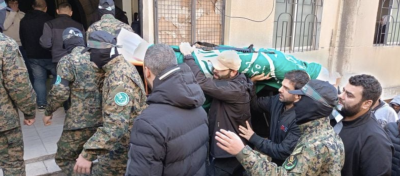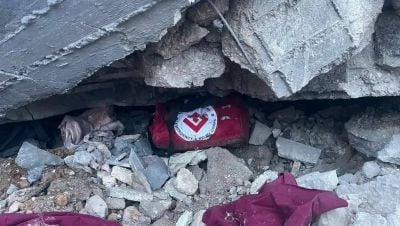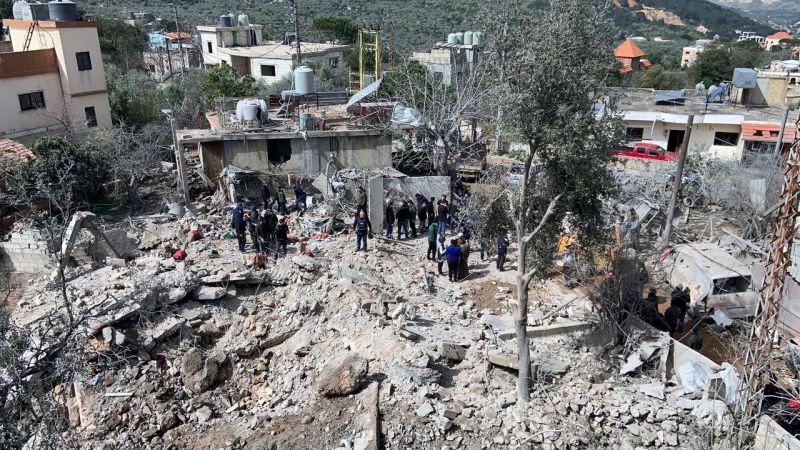
The impact of the Israeli strike on Tuesday evening in the village of Hebbarieh that killed seven rescue workers from the "Islamic Medical Association" center, affiliated to the Jamaa Islamiyaa. (Credit: DR)
In the small village of Hebbarieh, in Arkoub (southern Lebanon), the inhabitants are in shock. For the first time since fighting broke out between Israel and Hezbollah on Oct. 8, the Sunni village of almost 2,000 inhabitants was targeted by an Israeli aircraft last night. The targeted attack on the one-story center of the Jamaa Islamiya-affiliated "Islamic Medical Association" killed seven rescue workers, the oldest of whom was 25 years old, and all from the village.
"Until then, the heart of the village had been spared, but what has happened is a game-changer," local resident Yasser told L'Orient-Le Jour. The outskirts of the area had already been hit several times by artillery fire, while a drone strike killed three members of the Jamaa Islamiya in mid-March.
In the middle of the night and around dawn, departures were seen in the village, with several cars leaving the area for safety.
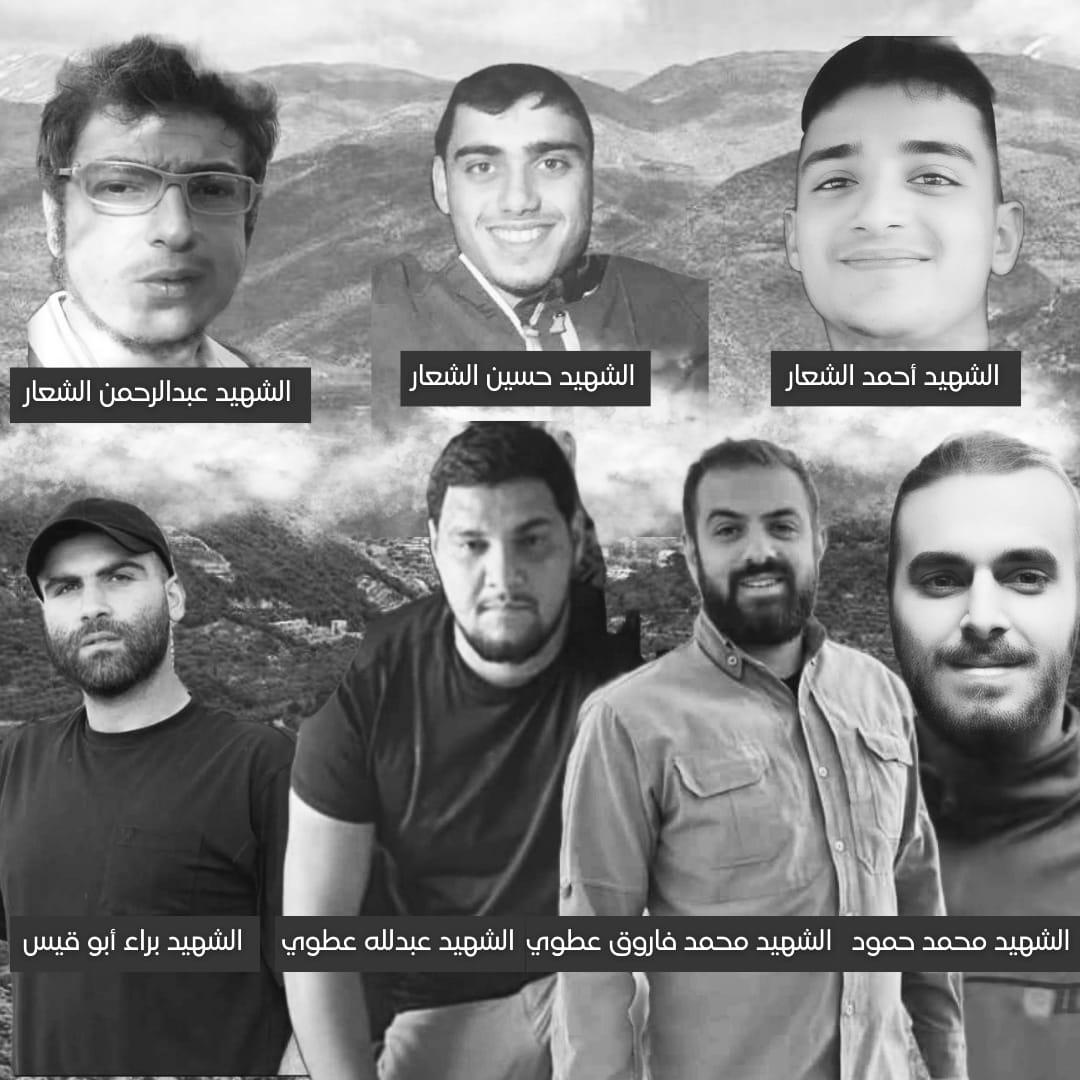 Photomontage of the seven rescue workers killed in Hebbarieh on March 27. From top to bottom and left to right: Abderrahmane Chaar, Hussein Chaar, Mohammad Ibrahim, Ahmad Chaar, Mohammad Hamoud, Mohammad Atoui, Abdallah Atoui and Bara Abou Kaïs. (Credit: DR)
Photomontage of the seven rescue workers killed in Hebbarieh on March 27. From top to bottom and left to right: Abderrahmane Chaar, Hussein Chaar, Mohammad Ibrahim, Ahmad Chaar, Mohammad Hamoud, Mohammad Atoui, Abdallah Atoui and Bara Abou Kaïs. (Credit: DR)
That afternoon, a leaden atmosphere permeated throughout the village as the bodies of Abdallah Atoui, Mohammad Atoui, Bara Abou Kais, Abderrahman Chaar, Hussein Chaar, Ahmad Chaar and Mohammad Hamoud were laid to rest. "Bara wanted to leave the café early, so we held him back to sing because he has a beautiful voice. Then he left shortly after midnight to join his friends at the center," says Ziki, 35, who was contacted by telephone. On the way, Bara met another friend who told him of his "bad feeling." "Tell the youngsters not to hang around the center too much," he was told. According to several locals interviewed, Israeli drones had been hovering dangerously over the village for several days, foreshadowing the worst. "Bara told him a joke about MKs (drones) and went on his way," laments Ziki.
Shortly after 12:30 a.m., the sound of a missile was heard, followed by a loud explosion that shook the houses. Assaad woke up in a panic and ran to the bedroom of his two children, aged 11 and 8. "The windows exploded, but fortunately they weren't hurt," he says. His building is opposite the medical center. From his roof, you can see the place reduced to rubble, as well as material damage to the houses and vehicles parked all around. "Because of their (Jamaa Islamiya's) presence in the village, I was sure this would happen," says Assaad.
"Heinous crime"
The Civil Defense rushed to the scene shortly after the strike, which caused a fire. Six bodies were first discovered. "It was panic, there was no electricity. Bara's body was found last. There was almost nothing left of him. His body parts were scattered all over the place," recalled Ziki, who was at the scene.
A dozen or so young people used to meet at the center every evening until late at night. Ten minutes before the tragedy, when there were nine of them, two went home, one of them after receiving a call from his mother ordering him to come back "because [he] has classes at the university in the morning."
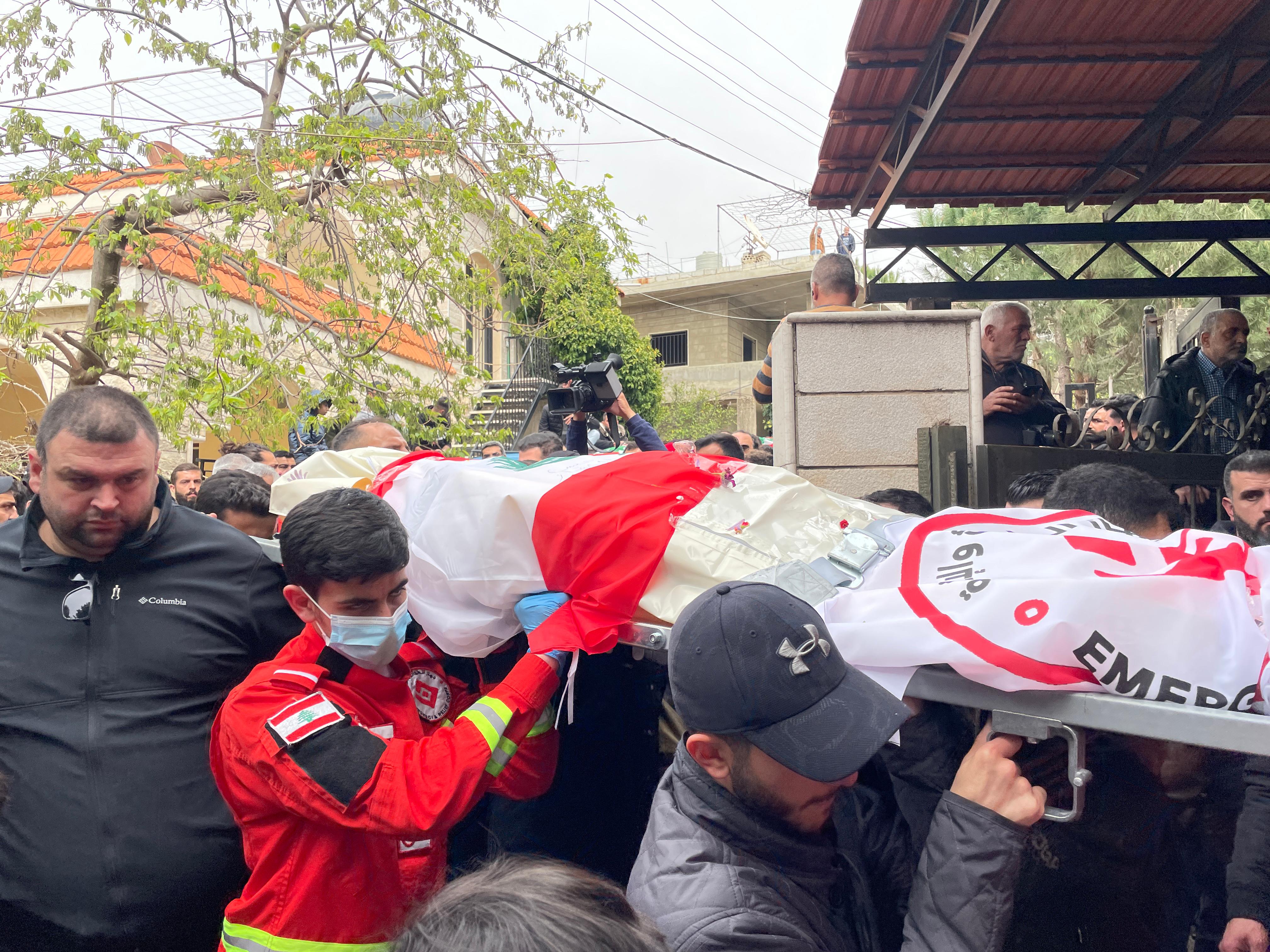 The funeral of the seven rescue workers in Hebbarieh. (Credit: DR)
The funeral of the seven rescue workers in Hebbarieh. (Credit: DR)
In a statement, the Islamic Medical Association denounced "a heinous crime from every point of view." "It is a blatant violation of international laws and conventions, and the perpetrator bears full responsibility," the statement continued. The Association called on the Lebanese authorities to "take the necessary measures to prosecute the criminals in international courts." Hezbollah also condemned "a heinous criminal aggression," and fired dozens of rockets at the town of Kiryat Shmona in northern Israel in response. Avichay Adraee, an Arabic-language spokesperson for the Israeli army, stated in a message posted on X (formerly Twitter) that the army had "eliminated a saboteur."
"Last night, warplanes attacked a military building in Hebbarieh in southern Lebanon, where a prominent terrorist belonging to Jamaa Islamiya was eliminated," says the Israeli military. The man in question "was involved in previous operations against Israeli territory, and was killed along with other saboteurs who were with him in the building."
Leaving the village
In Hebbarieh, as in the other Sunni villages of Arkoub, resistance to Israel is a sacred cause: In the lands of what used to be called "Fatehland," every family has had its share of prisoners or martyrs. But the presence today of Jamaa Islamiya, a group that has become an offshoot of Hamas, fighting in the shadow of Hezbollah, is no longer welcome in the village. The group officially acknowledges having lost five of its members since hostilities began in October, three killed in southern Lebanon in March and two in the attack targeting Hamas's number two in Lebanon, Saleh al-Arouri, on Jan. 2 in the southern suburbs of Beirut. Previously unscathed, Hebbarieh has been home to residents of neighboring villages such as Kfar Shouba and Kfar Hammam, regularly bombed and now virtually empty, since the beginning of the conflict. But last night's turnaround could change all that. Fear has taken hold at home, and many locals blame the presence of the Islamist group for endangering the entire village.
"Hezbollah wanted its Sunni cover, which it found with Jamaa, but these young people are not prepared for resistance. They have no military or weapons experience," laments Yasser, who works for a local NGO. "It's clearly a message from the Israelis telling them to stay out of the conflict. It puts the whole village under their radar," he adds, recalling that it also houses a military center and that several Jamaa members reside in Habbarieh among the rest of the population. "It's certain that everyone is now fleeing them like the plague," comments a villager who requested anonymity.
Assaad and Ziki, both fathers, say they decided to send their loved ones to Beirut, such as Umm Mohammad, who, after offering her condolences to the families of the martyrs, also intends to return to the capital. "I'm sad for these young people, but I have two boys aged 18 and 20 whom I can't stop going out at night. I'm now afraid they'll be in the wrong place at the wrong time," she admitted sorrowfully.
This article originally appeared in French in L'Orient-Le Jour.
